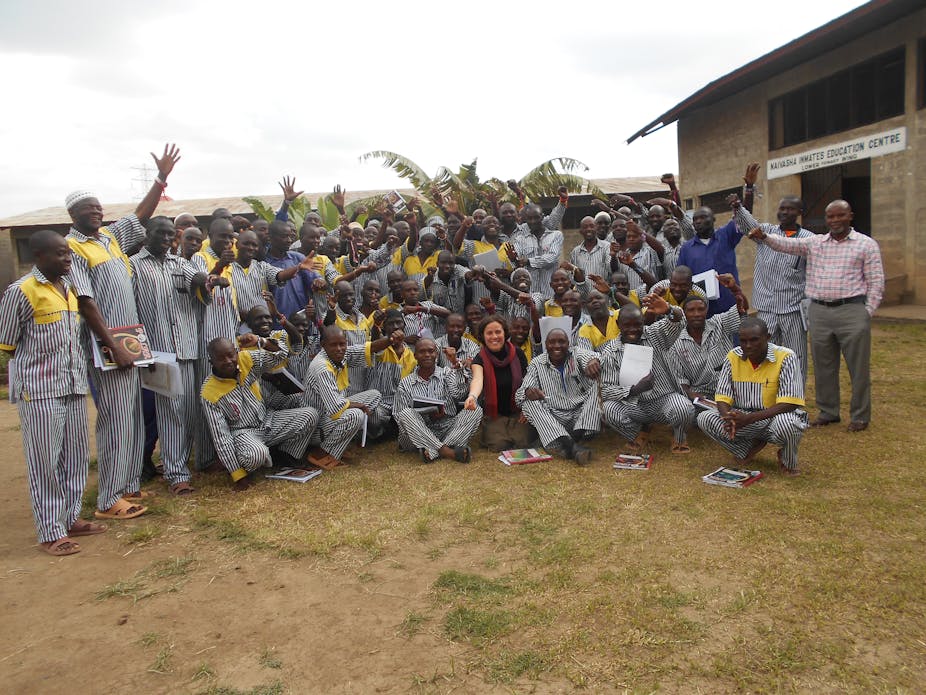Naivasha GK Prison is Kenya’s largest maximum security prison. Just a few months ago, before the transfer of hundreds of inmates, many of Naivasha’s 3000 prisoners were serving life sentences or facing the death penalty. The conditions were harsh and unremitting but things are slowly getting better.
Two years ago I started a mindfulness training programme at the prison. Mindfulness involves being present in the moment, and paying attention without judgement to what’s happening within and around you.
The programme brought together different elements of my research to change the prison culture by inspiring the inmates to lead themselves and others. Our goal was to transform the prisoners into mindful leaders.
This programme was timely because as late as 2016, the African Prisons Project was reporting that many prisons on the continent operate at 300% capacity and around 80% of inmates do not have basic access to justice. A good number of Kenya’s prisons were built in the colonial times and some lack the necessary facilities for rehabilitation.
The culture in many prisons is characterised by despair, tension and aggression. But even in this environment I was treated well.
Our programme used a unique combination of Mindfulness Plus training (which combines traditional mindfulness practices with new techniques to rewire mental habits and release emotions and social identity processes (which are rooted in creating a common sense of ‘us’). It’s through this programme that inmates transformed themselves into mindful leaders.
This powerful combination has been so effective that, according to an impact evaluation report, it’s now catching on at other institutions across Kenya from the capital Nairobi to Kitale, a town in the Rift Valley.
This programme goes beyond the traditional mindfulness training offered in some US, India and UK prisons. It has evolved to fit the needs and potential of its participants. In addition, the approach resides in the mindful leader identity, something that hasn’t been used in any other prison in the world.
Positive results
In 2015 I trained the officer in charge of the prison, Patrick Mwenda, after which he asked me to work with his staff and inmates. This was closely followed and supported by the Director, Offender Correction and Rehabilitation, Mary Khaemba, who had been trained in the UK.
By March 2017, an estimated 1000 out of 3000 inmates, had either directly or indirectly benefited from the training. Mwenda described the impact of mindful leadership as being a “force to be reckoned with.” Extensive quantitative and qualitative triangulated evidence, which was gathered during the programme and contained in the report, supports this statement.
The data demonstrate a stark change in the prisoners themselves and their interactions with others. Before the training most prisoners felt hopeless. They engaged in aggressive behaviour and exhibited a strong sense of “us” versus “them”.
Following the training, prisoners reported that they could lead their lives more mindfully, had found fresh purpose and that their lives now had meaning – even for those who expected to spend the rest of their days behind bars.
The qualitative results showed that inmates have improved relationships with their families outside prison, as well as stronger bonds with individuals in the prison. Quantitative results revealed a strong link between mindfulness, mental well-being and resilience.
In February 2017, all the qualitative evidence was compiled and used to generate a quantitative questionnaire. The questionnaire was used to study the success of the training on individual inmates, the prisoners as a group, the institution and the wider society. The results were extraordinary.
80%-90% of 140 inmates surveyed reported that they:
Felt less stressed and less angry
Were able to forgive themselves and others
Were able to let go of what they cannot change
Being a mindful leader was an important part of who they are
Engaged less in conflict and aggression
Manage their emotions better
Had a better relationship with prison officers
Had more respect for rules and regulation
Were using drugs and alcohol less.
How the change happens
Mindfulness allows those who practice it to be more aware of themselves and their surroundings. Mindful individuals observe and accept their circumstances without judgement or immediate reaction.
One of the most important and perhaps most difficult aspects of mindfulness is the idea of acceptance. To be clear, accepting one’s circumstances is not the same as not wanting change. Individuals can still work towards change even as they settle into an acceptance of who and where they are.
Numerous mindfulness studies have demonstrated that self-awareness and self-acceptance are essential for improved well-being, health, performance and quality of life.
But in the prison context, acceptance alone is not enough – the accumulated emotions and negative sense of self need to be addressed mindfully too. Our programme taught the inmates how to release their emotions and move into a new sense of self.
What next for the Naivasha inmates?
The mindful leaders of Naivasha are now driving the mindfulness revolution. Since 2016 the training has been part of the prison’s curriculum and is taught by inmates. This means that people in Naivasha can now take mindfulness modules.
The teachings are transmitted in different ways including through song, poetry, art and mindful affirmations. The mindfulness materials have been translated into Kiswahili and will soon be translated into French.
The programme has been formally transferred to the Lang’ata Women’s Prison, a maximum female facility in Nairobi, and more than 16 other institutions in Kenya have also adopted it.
Finally, as one of the inmates said:
I may never leave prison, but I am now free.

